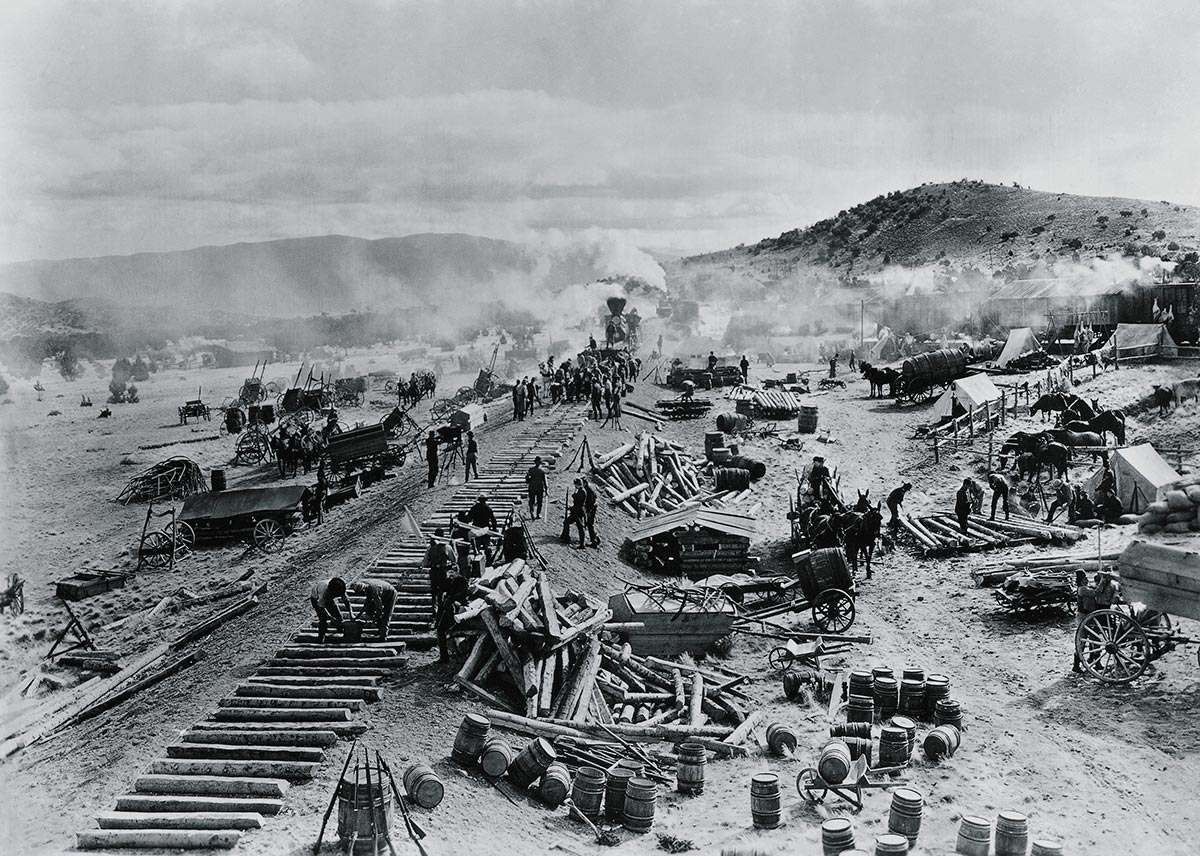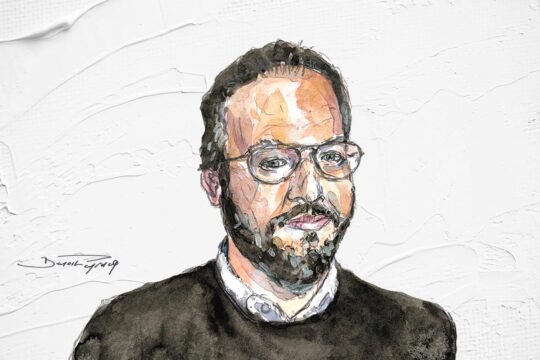JUSTICE INFO IN-DEPTH INTERVIEWS
Joanna Kyriakakis & Mark Drumbl
Why international courts have been so impotent at prosecuting businessmen? Why international law has shielded companies from responsibility in atrocity crimes? Would prosecuting a CEO be subversive enough or would it be cosmetic change? What if international law has actually hampered national efforts to hold corporations responsible? In a bold conversation, law professors Joanna Kyriakakis and Mark Drumbl attempt to unpack the reasons why so little has been achieved in going after the money trail.
JUSTICE INFO: Joanna Kyriakakis, in your thesis you wrote: “Attention to business actors has been at best marginal in international criminal practice to date, despite repeated statements of intent by prosecutors to prosecute business actors for their part in international crimes.” Why so many international prosecutors have announced that they would go after the money trail and failed so clearly?
JOANNA KYRIAKAKIS: I think there could be quite a few different reasons. One is simply the nature of international criminal law principles which makes prosecution of a financial accomplice in atrocities a challenging proposition. What needs to be demonstrated to show the very high level of criminal responsibility makes the prospect of a prosecution a little bit uncertain. That’s probably a primary factor. Other factors may be simply that they're not the most visible or not considered the most responsible of participants, because their participation is more indirect, which also might make the prospect of explaining those prosecutions less straightforward to a general public. Having said that, I think there are some clear indications that some of the international court prosecutors have a view that financiers of atrocity are in fact among those who are the most responsible. My main thought would be that it is ultimately about the challenge of meeting the principles and it has been largely untested since Nuremberg, with the exception of a few domestic prosecutions. So it’s an uncertain terrain.
Can you be more specific about these kinds of obstacles? What makes it so difficult?
JK: I am thinking about legal principles of complicity: when can we say that someone who helps another commit a crime is guilty of it when what they have provided might be described as a neutral contribution? In other words, if I have given you money, and you have used that for both lawful and unlawful purposes, under what circumstances am I responsible for your unlawful behavior as opposed to your lawful behavior? The first few prosecutions will, in a way, be the testing ground. I think they need to happen, because we need to understand better and more clearly the bright lines around when business is becoming criminally involved and when businesses are simply doing what businesses do, which is in some people’s minds amoral.
The International Criminal Court (ICC) has been under a lot of criticism for the choices of prosecutions, the times that it takes for those prosecutions, the challenges of getting guilty outcomes, and it doesn't seem like a climate that would be easy to be a pioneering prosecutor.
Why something that seemed to be very clear at Nuremberg – where they did go after some business executives – would be more complicated now?
JK: There have been some domestic efforts which demonstrate that it can be done successfully, in the right circumstances. But we have not seen that internationally, why? The principles that were applied at Nuremberg were, I would say, and Mark may disagree, prototypes of the principles we have now. There is an expectation now that principles that are going to be applied to an accused person would be clearer.
There is obviously also politics at play. The prosecutions at Nuremberg were in a really unique context: it was total defeat, there was an occupation of Germany that allowed access to large amounts of documentation. The politics now of criminal prosecutions are just very different and that has implications for prosecuting private actors, as opposed to other types of actors. There is a very different political environment that is at play.
What about [the responsibility of] corporate entities as a whole for atrocity crimes? That area is completely absent at the international level in terms of any kind of a vivid discourse.
MARK DRUMBL: My first reaction is that the conversation so far has been very narrow and in a sense very small. What we’ve been talking about is how to hook in an individual defendant who runs a corporation to mass atrocity and that relies on theories like aiding and abetting, material support, the role of financing in this process. And those theories would apply if someone was active as a corporate agent, just as they would apply if someone was a government agent, a non-state actor agent or any other agent that supplies, let’s say, resources to a direct perpetrator of human rights abuses. So this whole conversation so far about business actors is still about individual people facing individual criminal liability.
Which belies what I think is the most important issue: what about [the responsibility of] corporate entities as a whole, regulated in their own legal personality, which they all have, for atrocity crimes? And that area is completely absent at the international level in terms of any kind of a vivid discourse.
So really, when we’re talking about business actors we’re talking about a handful of people whose connections to violence may be financial and who happened to be in a corporation. But that is an easy answer to the question of how we feel about corporate criminal responsibility because it focuses on a very traditional understanding of wrongdoing. It doesn't speak at all about structural issues of wrongdoing, which leads me to a second observation. Why corporations are not being held accountable and why are we having these small conversations that tinker on the margins instead of the really difficult conversation: how should we make corporations liable, and why are they not liable? I’ll tell you why: because no one really wants them to be liable who wields any kind of influence in the making of international law.
At the negotiations to set up the Rome statute [that governs the ICC] when there were conversations about corporate criminal liability, as entities themselves, that went nowhere. Everyone was so desperate for a court that everyone said: Well, we’ll just make sure that it’s only individual criminal responsibility for blood and flesh people, not entities with legal personality alone. So we don’t want it – that’s it! That’s the simple answer: the will is not yet there among powerful actors to establish this as a norm.

We’re just not comfortable in international criminal law with the idea of structural wrongdoing; we’re much more comfortable with blaming a small number of individuals.
There is no will because we live in a world where neoliberal capitalism is largely fetishized. Any society’s transition from autocracy to sunny skies and sunny days is all rooted in a move towards neoliberal market-based economics. And as a result, I think conversations about corporate criminal responsibility go nowhere because we’re all enamored with a model of political economy that is rooted in the limited liability of corporations, which includes very little space for corporate institutional accountability for human rights abuses. And until corporate law is no more and is replaced with communal law, or whatever you might want to call it, we’re going to just be in the same very limited boat where the maximal possibility of conversation is a handful of really bad individuals running corporations, who will be deemed to be too sadistic or too savage or too unworthy of retaining the limited liability benefits that still accrue to the corporation. We’re just not comfortable in international criminal law with the idea of structural wrongdoing; we’re much more comfortable with blaming a small number of individuals.
Joanna, do you agree there is such a systemic blockage that explains the situation we’re in?
JK: I agree with a lot of what Mark said, in the sense that there has been, clearly, a really sustained political opposition to corporate criminal responsibility in international law. If you look at the history, going right back to the early efforts to create the ICC, there's just this constant, sustained putting off of that proposition and preference for individual responsibility. I think it’s true that there just isn't sufficient support from powerful actors, because of the implications it would have for their benefiting from the particular economic model we globally operate under.
We sometimes underestimate the subversiveness of the proposition of heads of major companies being the subject of individual criminal responsibility for atrocity.
I agree with Mark that corporate responsibility would move us a little more toward a form of structural responsibility. But I think that there has constantly been powerful voices in support of the proposition. Quite significant states have supported the proposition at various points in time but never enough. In some ways, we sometimes underestimate the subversiveness of the proposition of heads of major companies being the subject of individual criminal responsibility for atrocity. I think that if that were actually to happen internationally it would be quite a subversive matter because, in many respects, the way in which corporate law is meant to operate is to protect these individuals who are at the head of these structures.
Some are arguing that those of us who advocate corporate responsibility – the entity being made liable – are actually supporting this whole kind of neoliberal capitalist system, because we are saying: Yes, it’s the company that’s acting, it's not the sort of individual wealthy elite, you know international private actors. If we were to see that kind of individual prosecutions that would be quite subversive. But would we see that or would we see the sort of lower-level company officers being more likely to be prosecuted?
So here the idea would be that if you actually had an individual being prosecuted and convicted for such crimes, the effect on every executive of any corporation would be so big and so efficient that it would actually change the situation more than what Mark says?
JK: I think it’s possible. There's a prosecution that is taking place in Sweden at the moment of a chairman and a former CEO of Lundin Energy for the company’s behavior in Sudan. It’ll be interesting to see where that goes but that must be causing CEOs, chairpersons, and heads of boards a little bit of discomfort - I mean the idea that responsibility could be taken all the way up that level of a corporate chain. Ultimately there are individuals who are, in some instances, making these decisions. So I think that would be a subversive outcome in the space of corporate and business conduct.
I think there has been a pretty sustained, increasingly sophisticated conversation happening at an international level about companies being held responsible for atrocity. If it happens, we are likely to see it happening in domestic legal settings.
Having said that, there is a lot to support the move to actually make corporations responsible also and I do agree that they have been shielded. It will often be extremely hard to find an individual who you could properly say is responsible for the behavior of a structured system. And it may not always be appropriate. So I am in some ways in agreement with what Mark is saying, but I think there has been a pretty sustained, increasingly sophisticated conversation happening at an international level about companies being held responsible for atrocity. If it happens, we are likely to see it happening in domestic legal settings.
There are at least two high-profile current cases that everybody is referring to: Lundin before a Swedish court and Lafarge before a French court where they're actually prosecuting both the corporation and individuals. Is that an ideal situation in your view?
JK: Yes, it is. As I said, it depends certainly on the circumstances of the case, but if there is evidence that can connect both an individual at a high-level sufficiently with the crime, and also the company being used as an apparatus for that, then yes, I think that is appropriate.

Mark, do you take these cases seriously or do you consider them as side shows?
MD: Well, everything has relevance and every show has a side to it, right, and I also don't mean to be a cynic but I think it's important to say that just because you see a star in the sky once that doesn't mean that you see an entire constellation. And I also think we need to be mindful of something else here: I completely agree that domestic spaces are the best to move forward – I would argue that for all forms of accountability for atrocity – but we need to be mindful of what is the role of international law in domestic prosecutions. We always seem to think that international law is inherently progressive, that it moves things forward, lifts domestic systems out of some purgatory into a more heavenly space, but when it comes to corporate liability, we can sometimes see the opposite.
Take, for example, the United States, the Alien Tort statute that ascribes tort liability to customary international law crimes. For about two decades human rights activists sued large multilateral and multinational corporations for human rights abuses and obtained monetary damages against those corporate actors. Now, a couple of years ago, the United States Supreme Court ruled that corporations could not be responsible for committing international violations of customary international law, that they lack the requisite personhood and hence could never be a defendant in those cases; you could only pursue a small number of individuals. One of the reasons the U.S. Supreme Court relied on was the lack of corporate criminal responsibility under international law, pointing to all the international criminal tribunals and the ICC, saying it meant that there was no reason to extend that into domestic law. So ironically, international law’s reluctance to deal with it infected a national legal space or gave a pretext to a conservative court to say: ah! we're going to reverse previous decisions and you can't have corporate responsibility for serious international crimes!
I think we need to be mindful that international law can lower as much as it lifts, and here we really see this kind of a lowering dynamic. We need to recognize that on the topic of subversiveness, there's also subversion and here, in a sense, international laws subverted a domestic legal process that had considerable expressive value.
If we look to international law to raise up domestic systems, it’s actually doing the opposite, it's pushing them down because of the limited scope that it has applied to atrocity.
JK: The dominance of the international criminal model in international law and dealing with atrocity has had the exact effect that Mark is speaking about. In both domestic systems and in the international system, there’s always been a bit of discomfort with the idea of corporations, non-human entities, collective entities having the kind of moral agency that warrants the finding of criminal responsibility – in other words, the finding of a moral impropriety. This model being the dominant one internationally in responses to atrocity has been at least a part of the picture as to why international law has pushed to the margins or not wanted to deal with corporate accountability for atrocity. And the effect of that is, if we look to international law to raise up domestic systems, it’s actually doing the opposite, it's pushing them down because of the limited scope that it has applied to atrocity.
Whereas in domestic systems we have multiple accountability models – we have tort law, we have administrative law – and these are traditionally areas of accountability that we have been more comfortable with applying to the non-human entity. I absolutely agree that international law has perhaps held us back for some time in what domestic courts might have pursued.
I really don't think international law is the answer; it's too anemic, it's too territorial, it’s itself too compromised. I think the only response can be political revolution at a national level.
MD: The entire conversation about corporations so far has been predicated on their proclivity to be complicit in international wrongs or, structurally, to themselves organizationally inflict these wrongs. Perhaps conversations about corporate responsibility and personhood in that space might also proceed better if we looked at different personality traits that corporations themselves may have.
Another is the corporation as a tool to secure justice or to punish others. Take Russia, Ukraine, for example. The extensive divestment that's occurring in the Russian Federation, corporate decisions to relocate, to move outside, governmental use of embargoes and economic sanctions, arguably are putting both those sanctions and these entities in a different role than wrongdoer, but almost as justice makers or pursuers of justice, in a sense.
And let's be honest: there's another angle that corporations have, which can also be as indispensable to the overall running and financing of the very mechanisms of international law, that have this love-hate relationship with them. Corporations, philanthropy and capitalism can fund lots of things, including the entire industry of human rights protection. So I think current corporate liability is reflective of the very ambiguous, nuanced and complex personality traits of corporate entities.
I really don't think international law is the answer; it's too anemic, it's too territorial, it’s itself too compromised. I think the only response can be political revolution at a national level, in which a different political approach to political economy is established. Maybe another way is to have a domestic penal or domestic corporate law that says: if you corporations are proven to commit certain wrongs, we're just going to eliminate you – you get corporate capital punishment. And then make sure that innocent shareholders aren’t affected by that. But I don't see any of this conversation coming from the International Criminal Court – this is like expecting a stagehand to play Shakespeare and it's just not going to happen.
JK: I think where I differ is that sometimes it is put a little bit too absolutely that international law and particularly the International Criminal Court cannot solve the problems that we're trying to address and something far deeper has to occur. Mark uses the term of “revolution”; we might say a radical rethinking of corporate law principles. I think that international law still has a part to play. There are efforts going on and the revised Treaty that's currently in place for business and human rights is trying to do some of what we're talking about; it’s trying to actually unpack some of the systemic advantages that have been given to corporations through the international and domestic legal structures that enable companies to do what they do, to operate global businesses largely immune from accountability.
Are you referring to the resolution adopted by the UN Human Rights Council to develop a binding international instrument on human rights violations by multinational companies?
JK: Yes, in 2014 a number of States led by Ecuador and South Africa brought the proposition that the international community of states should be working towards a treaty on business and human rights and, actually, that has been a fascinating political space.
Yes, there is a current effort to create a treaty on business and human rights. Despite an attempt to sort of put that completely off the table a fairly significant number of states have said: No, this is actually really important to us.
The debate over whether companies should be held directly responsible for human rights under international law has been going on for about 30 years. And there has been a very big pushback against the prospect of such a treaty; some corporations are very opposed, a lot of states are very opposed. But despite an attempt to sort of put that completely off the table a fairly significant number of states have said: No, this is actually really important to us. And they've started that dialogue again. So yes, there is a current effort to create a treaty on business and human rights, it's up to its third revised draft. Very interestingly, the draft does not propose imposing direct human rights obligations on companies, but rather is looking at ways in which to incentivize, enable states to fulfill their human rights duties by ensuring that companies are regulated adequately and to ensure that companies are brought to account when they are responsible for human rights abuses. And it's trying to do some gap-filling, as it were, to sort of have systems in place where a State doesn't do that because either it's complicit or it's just not in its interest to deal with the company's abuses on its territory.
Doesn’t it already sound like a very watered down treaty?
JK: I don't think that this approach is necessarily a weaker one. I think you can have models of corporate accountability that are set up through an international treaty that actually places the burden on states which could be quite robust. These treaties are going some way toward trying to create a better equality of arms between victims of corporate human rights abuses and the corporations themselves, for example through rules around shifting burdens of proof, around ensuring that forums to hear the cases are available, that third states can be appropriate forums for litigation. I don't think that the fact that it doesn't directly impose international human rights obligations on companies necessarily means it will be a weak treaty.
From the perspective of victim communities, I can see how having some material settlement is at least something of an outcome that could have material benefits to their community, and that may make it a much better proposition then continuing to fight for decades in order to get a merit hearing
We see more and more of out-of-court settlements between corporations and the communities affected by the industry. Do you see this as just buying off disempowered victims or as a valuable justice response, concrete reparations as opposed to a symbolic condemnation?
JK: I wouldn't describe settlements as outside of the law: it is a legitimate way of resolving a grievance in a civil court. From the perspective of victim communities, I can see how having some material settlement is at least something of an outcome that could have material benefits to their community, and that may make it a much better proposition then continuing to fight for decades in order to get a merit hearing that for them may have value but may not be as significant as having some material redress. So I don't see them as necessarily problematic; they are a legitimate way for a community to feel some resolution in the face of what is a very difficult proposition.
From an international community perspective it's a shame, sometimes, because I do wonder if the cases that are settled are ones where companies feel there is some real prospect of a negative or an adverse finding [in court]. And it would be helpful, for many of the rest of us, if we could hear those adverse findings, so we learn more about what has happened, about what the law permits and doesn't. In that sense, it can be unfortunate. But if they result in important material outcomes and say something, still, to the community that this company takes the view that this matter warrants a compensatory outcome, I think that does have some expressive value.
MD: A lot of this conversation on the settlements reminds me of conversations in American economic history, and the economic history of all early capitalist societies with regards to injuries, for example that workers may have suffered while working for the corporation. The greatest example is the westward expansion of the railways, which we're seeing as part of the inevitability of American expansionism and is endemic to a lot of settler societies. Canada is very, very similar in this regard.
While those railways were being built, many of the injuries that workers occasioned in building those railways were terrible – extensive death, extensive grievous bodily injury. The kinds of harms that I think when concatenated together would almost rise to a level of endemic human rights abuse. At that time, corporations were immune from lawsuits brought by the workers in court. So one response to that were these kinds of settlements that you're speaking of where the corporation would settle out ex parte on its own or through an insurance scheme, the harms that it occasioned. And here I totally agree with Joanna: we should listen more to individual victims and if individual victims want money, then whether that's through a negotiated side deal or not, who are we to judge sitting here?

Should we accept that corporate activity will inevitably trigger some human rights abuse? And if we accept that, ugly as it sounds, then perhaps we could have more conversations on global liability schemes that give financial support to afflicted groups and regions.
I think this behooves the bigger question which is: should purist applications of law apply to regulate corporate activity or should political, economic, negotiated, ad hoc solutions, like those that were part of American Labor history be accepted? Should we accept that corporate activity will inevitably trigger some human rights abuse? And if we accept that, ugly as it sounds, then perhaps we could have more conversations on global liability schemes that give financial support to afflicted groups and regions. But that means accepting that corporate activity is sometimes just going to hurt workers badly, and we don't care about intentionality, we just care about remedying the harm. And I wonder if that model would have a normative value, as Joanna suggested, because something is better than nothing, and now there's a lot of nothings in terms of redress.
But again, that falls outside the scope of international criminal law and, once again, it is more of an economic or political solution. So maybe we should have conversations about global insurance schemes that are set up for corporate wrongdoing in which there is no really hideous individual actor running a corporation that can be part of an individual penal process. I don't think settlements are ipso facto bad and maybe they could generate a broader conversation of having them become more legitimate.
The conversation that we have about corporate accountability tend to focus on the most extreme forms of violence. I think that conversations outside of that particular box would cover a much broader array of the pain that is inflicted by global capital.
So far the conversation that we have about corporate accountability tend to focus on, like international criminal law does, the most extreme forms of violence that are the most sensationalized and attract the eyes and ears of journalists and the global public. I think that conversations outside of that particular box would cover a much broader array of the pain that is inflicted by global capital.
It's very important for us to also recognize another limit of the International Criminal Court or any international institution. Many critical legal theorists have written for decades that it is often the most spectacularised forms of violence that become criminalized, or rebel groups who loose against more powerful governments. What I am hopeful for is that when we talk about corporate criminal liability it's not just to put, you know, IG Farben [a German chemical conglomerate that became a major Nazi government contractor] in the dock, the most extreme genocidal corporation, but to recognize the much broader forms of human rights abuses that are occasioned in that space that will never get to the level of The Hague, because they're neither sufficiently spectacularized, nor is there jurisdiction.
I think we're all three of us in agreement that the domestic place may put the best face on any accountability conversation. One other potential solution that I would suggest is that domestic statutes that regulate corporations have a much broader extraterritorial reach to them as opposed to the current reach. In the United States, a lot of the domestic regulation through law of corporations is limited to extraterritorial limitations unless the corporation has a very active presence in this country or at a minimum is registered on a stock exchange in this country. Even for financial crimes, the jurisdiction just doesn't extend. As we domesticate responses, we also need to interlink them more and more jurisdictionally to make sure that you can't just do a “corporate disappearing act”.
I agree that international courts are the spectacle but that the nuts and bolts happen somewhere else.
JK: The UN Special Representative on business and human rights made one point that was very important: there are no silver bullets when it comes to addressing corporate accountability for human rights abuses, if we're talking about corporate violence more broadly. I agree that international courts are the spectacle but that the nuts and bolts happen somewhere else. But if we're going to have spectacle, this should be part of the narrative, so that we really internalize the point that businesses are integral to atrocity and that they cannot occur without business participation.
The point Mark made about the importance of jurisdiction is one of the things that the Treaty is trying to deal with. Will it get there? Will it be strong enough? I don't know but it's trying to make it much clearer that multiple courts should have the power and the authority to deal with human rights abuses, even if they're not occurring on their territory. That is absolutely crucial, because at the moment, transnationally, litigants are so commonly stopped at the door by a whole range of procedural barriers.
You eradicate the corporation, you eradicate all these people's pension plans… There are huge economic ramifications. We need to recognize this.
MD: Corporations internally are also very complicated actors. Let's say the corporation face its death sentence, is being eliminated ; we need to realize that many large corporations have huge amounts of investments that are made by pension plans, mutual funds. People who have been schoolteachers for 40 years invested in these big blue chip companies because they're stable and they have a safer yield, etc. You eradicate the corporation, you eradicate all these people's pension plans… There are huge economic ramifications. We need to recognize this.
Individual criminal responsibility is always so much easier and that's why we have an international criminal court. You’re going after a handful of politically burnable and expendable people. Corporations, in our current neoliberal market structure, it's too tough to make them expendable. That's why I really think the conversation has to be with an utterly different set of actors than us. Maybe revolution is too strong a word; I'm not saying I support that revolution, I'm just being descriptive. To get corporate liability, you need a new model.
JK: The system has done an excellent job of making us all complicit. Maybe the climate change movement right now is changing the narrative a bit; there is some pretty strong movement going on for corporate shareholders to divest, to pay attention to what we are a part of. These movements are very connected, I think, to what you're talking about.
MD: On climate change, just like with broader corporate violence, we are all complicit. The fossil fuel industry has done an amazing job at making us all complicit. So therapeutically, maybe the first step instead of blaming the corporation, is for us to acknowledge ourselves.
Interviewed by Thierry Cruvellier and Clémentine Méténier

Joanna Kyriakakis is a Senior Lecturer of Law at Monash University (Australia) and Academic Member of the Castan Centre for Human Rights Law. She researches corporate accountability through the prisms of international criminal law, human rights, transitional justice and tort law. Her most recent publication is the book 'Corporations, Accountability and International Criminal Law: Industry and Atrocity' (2021, Edward Elgar).

Mark A. Drumbl is the Class of 1975 Alumni Professor of Law and Director of the Transnational Law Institute at Washington and Lee University, Virginia, USA. He is author of ‘Atrocity, Punishment, and International Law’ (CUP, 2007), ‘Reimagining Child Soldiers in International Law and Policy’ (OUP, 2012), and co-editor of the Research Handbook on Child Soldiers (with Jastine Barrett, Elgar, 2019) and ‘Visualities and Aesthetics of Prosecuting Aged Defendants’ (with Caroline Fournet, Brill, 2023). Together with Barbora Holá he is currently writing a book called ‘Getting Collaborators’: Stories and Sentiments from Communist Prague’ (OUP, 2023).






